
How to Capitalize on Local SEO Using Micro-Moments
What Are Micro-Moments?
Micro-moments are the times when the consumer is deciding on what to buy. The most common example is when you go to the grocery store and think about what to buy. But in the context of hyperlocal search, it takes on a more digital outlook.
Micro-moments can be defined as those brief but powerful moments in time when a customer or prospect has a strong desire for action.
This might be to learn more about a service, or they're ready to make a purchase. It is a key component in determining the effectiveness of your digital marketing campaigns.
Tips to Use Micro-Moments to Boost Your Local & Hyperlocal SEO
1. Start With A Strong SEO Foundation
When you're engineering your micro-moments for hyperlocal search, the first thing to do is build a strong base. This means you need to focus on creating an SEO framework that can cater to micro-moments.
Strategies To Build A Strong SEO Base
If you want to rank for your brand, it's important to consider everything that makes up a successful website. SEO is a lot more than just writing keyword-rich content.
When it comes to SEO, it's important to understand the basics and how to use them to build a strong base for a brand. Hyperlocal SEO is one step ahead.
What if you could tap into the real-time activity of your audience?
This is the foundation of a strong hyperlocal SEO strategy. The key to hyperlocal search marketing is to identify the moments when people search for a specific service.
- SEMrush is a wonderful platform for creating your SEO foundation. It has all the tools you need.
- Evaluate the core web vitals of your website with Google LightHouse. It can improve your KPIs significantly.
- Something that gets lost with finding the right tool is knowledge. Research is the best way to build better SEO.
Here’s a screenshot of SEMrush:
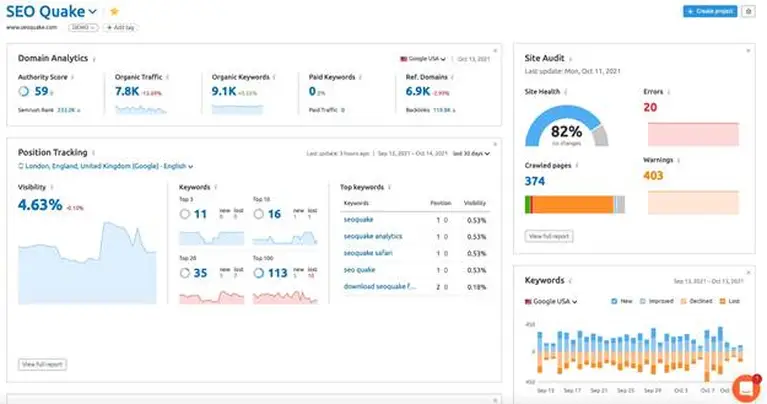
2. Focus More On Hyperlocal Listings
A hyperlocal listing is a listing that focuses on a specific area, such as a neighborhood, city, county, state, or country. A business can target its audience better through a more focused local presence.
Leveraging Hyperlocal Listings For Business
Hyperlocal SEO is about creating an online presence for your business that is relevant and useful to the community you serve. We're living in a time when the internet is becoming more localized.
This means that people search for things near them, like local restaurants and services, finding you. The challenge is that if you have a website, it needs to have localized elements. If it doesn't, people won't be able to find you easily.
- Hyperlocal listings are the way to go forward for businesses of all niches. Ensure you have your NAP correct on all listings.
- Google My Business is one of the best examples of hyperlocal business listings.
- Yelp and Yahoo Local Listing are also worth looking into for total coverage.
Here’s a screenshot of Yelp:
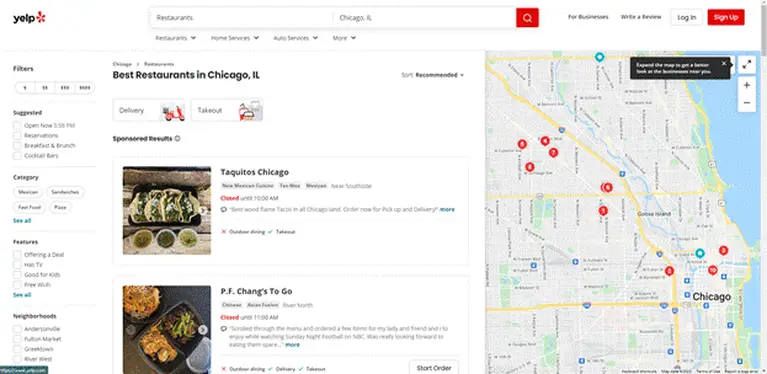
3. Research Relevant Hyperlocal Keywords
Hyperlocal SEO is a lot more complicated than simply finding the most popular search terms on the web.
There's a lot of competition for the same keywords, and it's not always obvious how to take advantage of local search. The key is to narrow down keywords with detailed research.
Finding The Right Hyperlocal Keywords
Getting the right keyword profile can be invaluable to your SEO strategy. It needs to have the right mix of relevance and local strength. The reason is that local markets are super competitive regarding keywords.
If you want to improve your rankings, make sure you have high-quality content. It should be written with the intent to drive traffic and interest to your site.
- Google Keyword Planner comes at the top of any keyword research tool. It is powerful and free to use.
- Ahrefs also has a powerful keyword research module that can help.
- KeywordTool.io is another option that is used by people all over the world.
Here’s a screenshot of Google Keyword Planner:
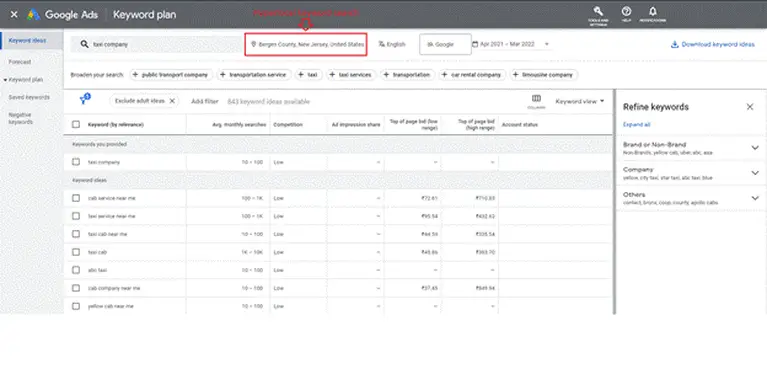
Read: 15 Best Keyword Research Tools Used By Top SEO Companies
4. Aim To Become More Mobile-Friendly
Mobile devices are an integral part of the conversation when talking about micro-moments. They are what people use to fulfill their immediate micro-moments. And for this reason, your website needs to become more mobile-friendly than others.
Making Your Website Mobile-Aligned
For over a decade, Google has been working to make the web mobile-friendly. The company has made several changes to how it ranks pages. This includes adding a mobile-friendly label to it. It also updates its algorithm to reflect that mobile users are a distinct user type.
This means you should make your site more mobile-friendly. Some steps you could take are tweaking your content to optimize your images. All these will encourage people to realize their micro-moments with mobile platforms.
- One of the most popular tools here is Google's PageSpeed Insights. It can make your website mobile-friendly.
- Image editing tools like Adobe Photoshop and Imgur help optimize visuals on your website.
- Bootstrap can help you quickly build a responsive website from the ground up.
Here’s a screenshot of Google’s PageSpeed Insights:

5. Visualize Your Customer Journey
One of the biggest mistakes local businesses make when trying to rank on Google is not listening to their audience. It can be tough to rank if a business doesn't care about its users as much as its services.
Suppose you cannot tell a good story about why your customers should care about your business. In that case, your chances of ranking highly on Google are slim.
Building A Good Customer Experience Pipeline
For businesses today, it has become critical to improve how they present themselves to their customers. There are three main types of customer journeys in the market. They are one-time purchases, repeat purchases, and long-term relationships.
These customer journeys have their own set of tactics that can help you build a better relationship with your customers. You can use the same tactics to improve all three of these customer journeys.
- A good strategy is to listen to your employees. They might have great ideas to improve your appeal.
- Focus on customer journey mapping across your product line. Each of your products needs to be appealing to your customers.
- Record and implement current market trends to improve your brand image.
Surveys are excellent for listening to what your employees think about your business:
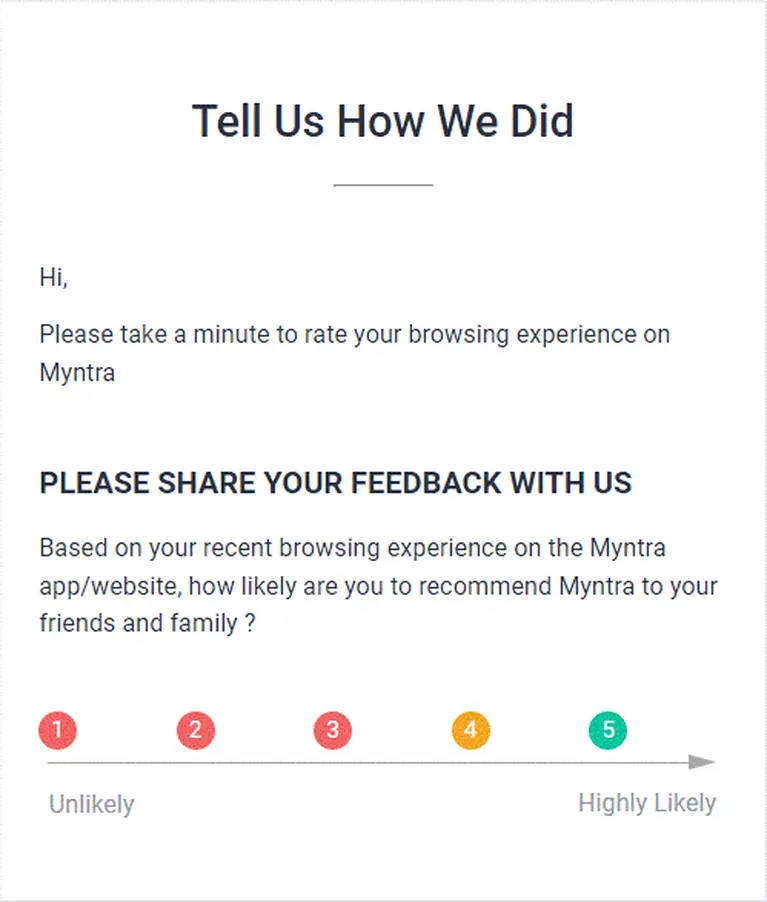
6. Opt For Written And Visual Content
One of the most important things that you can do to improve your local SEO is to create content that appeals to people based on their location.
This is important because Google has used several factors to determine which websites are most relevant to a particular search. And it is also important to focus on text and visual content.
Read: Creating High-Quality Content For Local SEO
Content is what bridges the gap between the user and the brand. Quality content is tied closely with micro-moments and hyperlocal SEO. It is critical to implement strong content creation strategies that can improve branding.
Content strategy can have a positive impact on your brand image. Videos are one of the best content platforms available for local SEO. But, it's important to note that you shouldn't create a video just because you can.
- All content you create should have the underlying brand message to improve conversions.
- RendrFX is a great platform for creating attractive videos for websites and social media platforms.
- Ensure text content you create is error-free with Grammarly and Hemingway Editor.
Here’s a screenshot of Grammarly:
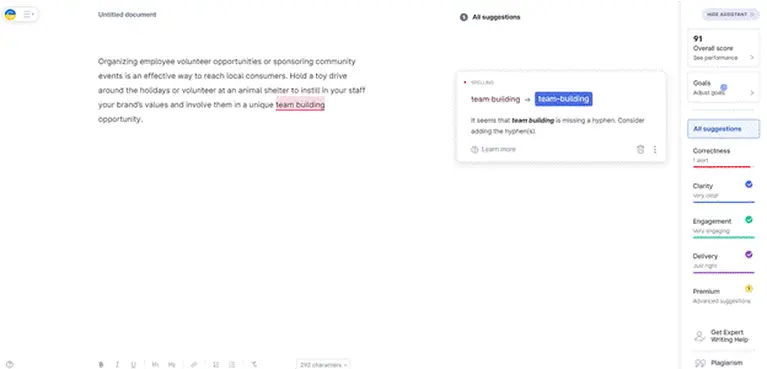
Key Takeaways
- Implement powerful hyperlocal strategies to enable micro-moment sales on your website.
- Focus on creating a powerful customer journey pipeline to improve brand image.
- Ensure that your website is mobile-friendly and easy to interact with.
- Research the right keyword extensively for hyperlocal relevance.
- Content is the foundation for creating a website aligned to user micro-moment.
ABOUT THE AUTHOR:
Brice Decker

Brice has been handling marketing projects for more than 12 years and he is providing consulting services on SEO, Social Media and PPC. He has a huge expertise in working at large corporations including Accenture Interactive & PwC Digital Services.
ABOUT THE AUTHOR:
Brice Decker

Brice has been handling marketing projects for more than 12 years and he is providing consulting services on SEO, Social Media and PPC. He has a huge expertise in working at large corporations including Accenture Interactive & PwC Digital Services.
Related Post
How to Rebrand Your Business Without Losing SEO?